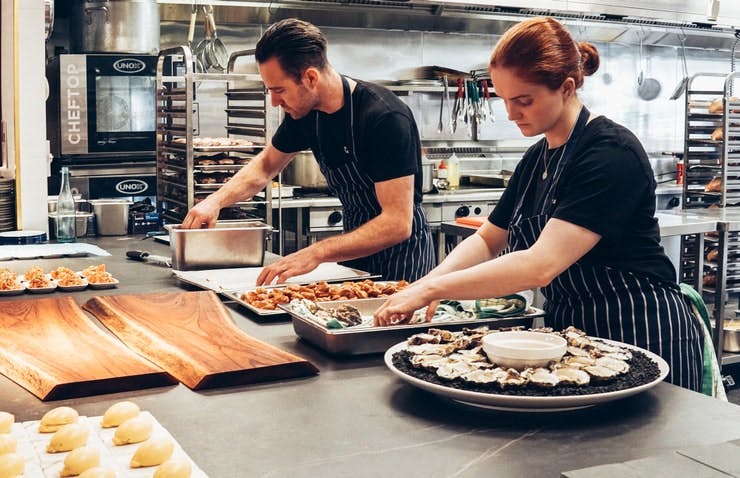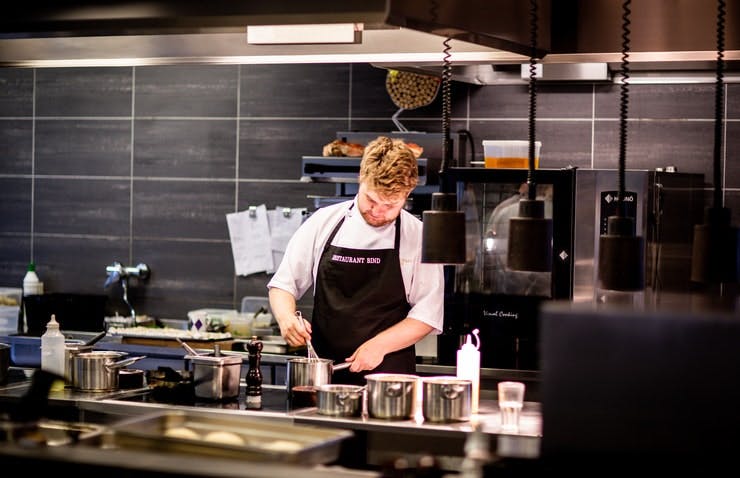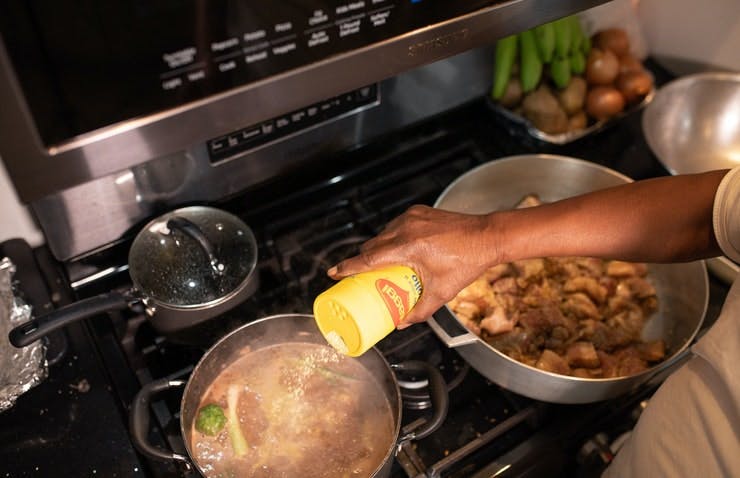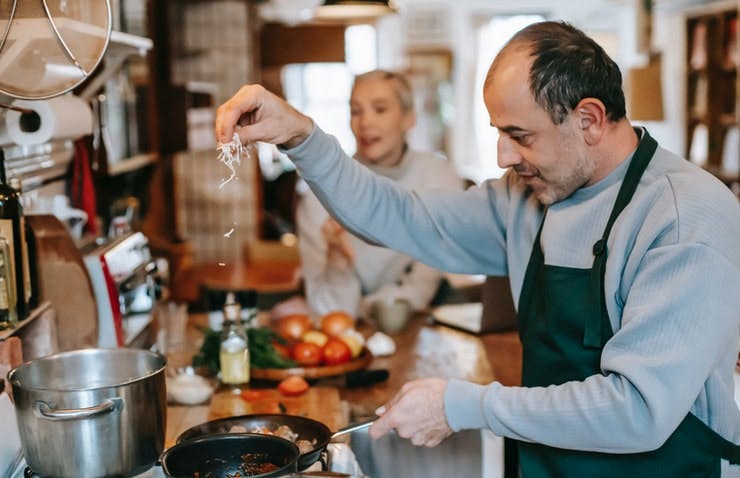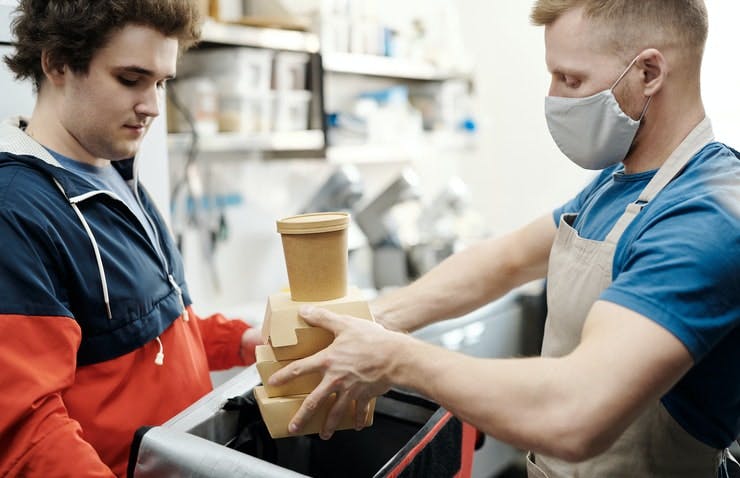10 TACCP Training Courses
We’ve compiled a list of 10 TACCP training courses that tap on topics like food contamination, food delivery and storage, food defense, food handling, and kitchen hygiene. Most of them are created to protect your business from the threats of intentional contamination and ensure the safety and security of the foods and drinks you serve to the general public. Consult our list below to learn more.
Last published: 6th May 2024
1. Food Contamination
Food contamination, both unintentional and intentional, is a major concern in the food-chain industry. If left neglected, it can lead to serious consequences for your consumers, such as food poisoning and foodborne illnesses, among many others. SC Training (formerly EdApp)’s Food Contamination is a free TACCP training course designed to help food workers prevent the possibility of food contamination in their operations. It delves into the different types of food contamination, including physical contamination, chemical contamination, biological contamination, and allergen contamination. It also highlights how and when they are most likely to occur and the best practices to eliminate them in your kitchen space. Moreover, cross-contamination will be explained to help your employees further understand how contamination spreads from one food to another and identify the right way to counter it.
This course is ready-made and can be deployed immediately to your employees. It also comes fully editable, meaning, you can edit and tweak the content to match your company’s regulations or rebrand it as you like.
Cost: Free
Scope: Introduction to food contamination, different types of food contamination, practices to reduce and eliminate contaminants in the kitchen space, cross-contamination
Created By SC Training (formerly EdApp)
Explore this free course2. Food Safety Hazards
In this SC Training (formerly EdApp) course, you’ll get to explore the different risk factors affecting food safety, alongside general food-safe practices before, during, and after cooking to protect your customers from intentional contamination. You will also learn more about allergenic and physical food hazards, as well as biological and chemical risks, which are prevalent in this industry today. While it may be impossible to completely avoid all these food safety risks, having a sound understanding of how they are most likely to occur and the right steps to keep them at an absolute minimum can go a long way in ensuring the safety of your consumers.
To improve reinforcement and help check the learning progress of your employees, SC Training (formerly EdApp) has added a series of quizzes at the end of this course. For a more fun learning experience, they are delivered in a game format like true or false, missing words, dial distribution, and matrix.
Cost: Free
Scope: Food safety risk factors, allergenic and physical food hazards, biological and chemical food hazards, general safety practices to minimize risk for customers
Created by SC Training (formerly EdApp)
Explore the course3. Food Safety Standards (US, UK or AU)
Learn some of the most recommended food safety practices based on the industry’s safety standards with this editable microlearning course by SC Training (formerly EdApp). Here, expect five bite-sized lessons covering the food code and safety standards observed in the US, UK, and AU, and some directives that can help you run a safer establishment for your customers. While the specifics of food safety regulations vary by state and location, this course focuses on the set of guidelines that are followed by all food businesses around the world. This includes the safe cooking temperature to eliminate harmful pathogens, ways to sanitize food contact surfaces, and control measures to minimize bare-hand contact with the food supply. A quick assessment will be provided at the end of this course to check your learners’ understanding of food safety standards.
SC Training (formerly EdApp) used a microlearning design model to create this TACCP training course. Meaning, the modules are split into short and highly concentrated bursts, which makes the information easier to follow and comprehend. This course can be completed within minutes, and not days or weeks.
Cost: Free
Scope: Food safety practices, food safety standards in the US, UK, and AU, guidelines on how to run a safer establishment
Created by SC Training (formerly EdApp)
Explore the course4. TACCP & VACCP Training Course
This TACCP training course by Train4Academy can be taken by any food worker in manufacturing, retailing, or catering, whether they are in charge of cooking, producing, or storing food products. By deploying this course, your learners will gain solid foundational knowledge about the concepts of both TACCP and VACCP and their vital roles in protecting the public from malicious and ideologically motivated food contamination or supply disruption. It will also walk them through six practical steps on how to properly implement a TACCP assessment, assuring the security of the food and drink they’re serving. This course can be accessed using a desktop, laptop, or tablet. An official certificate will be issued upon successful completion.
Cost: £25.00 +VAT per person
Scope: Difference between TACCP and VACCP and their importance to food safety, implementing a TACCP assessment
Created by Train4Academy
Explore the course5. Food Safety and Personal Hygiene in a Professional Kitchen
This food hygiene course by FutureLearn contains bite-sized videos, long and short articles, and audio lectures related to food safety and personal hygiene, which are both extremely crucial in food preparation. Some of the topics covered include the importance of food safety laws, the implementation process to keep yourself and your kitchen environment clean, sanitary, and hygienic, different categories of food poisoning, and so much more. It also addresses food preparation methods and kitchen conducts that you and your team should adhere to and comply with during the COVID-19 pandemic.
At the end of this course, your team is expected to have the right set of skills and knowledge they need to prevent poisoning and contamination in the kitchen. This will give them the confidence to present and serve foods to the highest hygiene and safety standards since hygiene in a professional kitchen is more than just hand washing.
Cost: Free for 14 days; $279.99/ year for unlimited access
Scope: Food safety and personal hygiene procedures in a professional kitchen, the importance of food safety laws, different categories of food poisoning, food preparation, and kitchen conduct during the COVID-19 pandemic
Created by FutureLearn
Explore the courseExplore our library including TACCP training courses
6. Food Defense Manager
If you’re planning to develop and implement your own facility’s food defense program, then you may want to consider taking the Food Defense Manager course by Zosi and use it as your process guide and safety system. This course will provide you and your team a comprehensive walkthrough of the concepts behind food security, food fraud, food labelling, and food safety, and the important role of food defense in protecting public health. It will also explore some tools you can use to establish your food defense program, followed by some useful tips and tricks to mitigate purposeful adulteration threats.
Just a quick heads up that this Zosi course isn’t free, plus the subscription will only last for 6 months from the date of purchase. It also runs for 8 hours, which isn’t exactly ideal for workers with short attention spans.
Cost: $499 USD
Scope: Food defense and its role in protecting public health, the difference between food security, food defense, food fraud, and food safety, tools, tips, and tricks for developing food defense programs
Created by Zosi
Explore the course7. Food Defense Awareness for the Intentional Adulteration Rule
The Intentional Adulteration Rule 21 CFR Part 121—Mitigation Strategies to Protect Food Against Intentional Adulteration—requires the majority of food businesses to provide their workers with adequate training in food defense awareness. Generally speaking, this rule was established to protect facilities from the most vulnerable points of intentional food adulteration and contamination. You can take or roll out this TACCP training course by FSPCS to meet the training requirement of the IA rule and ensure optimal safety and sanitation for your consumers. Among the topics discussed here include the rules and regulations under the IA rule, how intentional contamination can lead to wide-scale illness, death, and economic disruption, and mitigation strategies that your facility can follow.
An FSPCA Certificate of Completion will be provided, which you must print off immediately as there will be no record retained once you’ve completed this course.
Cost: Free
Scope: FDA’s Food Safety Modernization Act rule: Mitigation Strategies to Protect Food Against Intentional Adulteration (21 CFR Part 121) (IA Rule), causes and effects of intentional adulteration, mitigation strategies
Created by Food Safety Preventive Controls Alliance (FSPCA)
Explore the course8. Food Defense Threat Assessment – TACCP
This Safe-food Training Hub course is also designed to help food workers meet the IA Rule 21 CFR Part 121 and help food establishments develop and implement a robust food defense program and hazard and threat risk assessment. It has a total of three modules, discussing practical methods on how to conduct a food threat assessment and develop your food defense plan based on your assessment analysis. This course also outlines some of the most important details that most food safety auditors check at an audit. This way, you will never end up with non-conformances at your next audit and avoid putting your consumers at risk.
Completely online, this TACCP training course can be taken even remotely. A course certificate will be provided upon successful course completion.
Cost: $140.00 USD
Scope: How to conduct a food threat assessment, ranking the assessment results, developing a food defense plan, food safety audit documentation
Created by Safe-food Training Hub
Explore the course9. Food Delivery and Storage
Also prepared by SC Training (formerly EdApp), the Food Delivery and Storage course provides a helpful guide on how to transport and pack hot and cold foods safely without risking these products to food contamination and spoilage. As they click through the lessons using their smartphones, learners will learn more about the most important aspects to look out for to ensure that the delivery is done in compliance with hygienic standards. It also presents a step-by-step guide on performing a sensory check when receiving deliveries and the best way to store foods so that they stay fresh for as long as possible and don't get contaminated.
This mini training course is enhanced with a few quizzes and gamification features to make it more fun and engaging for your learners. If you want to foster friendly competition among your team, you can also combine them with a scoring system, leaderboards, and real prizes like coffee vouchers or discount coupons.
Cost: Free
Scope: Food transportation and receiving deliveries, sensory checks, cold and dry storage guidelines
Created by SC Training (formerly EdApp)
Explore the course10. Food Prep
SC Training (formerly EdApp)’s Food Prep course, as the name implies, presents comprehensive guidelines on safely preparing foods, ensuring that they are ultimately safe for consumption. Here, the trainees are expected to learn the right ways of thawing, cooling, and reheating foods in order to prevent the growth and breeding of any harmful microorganisms. It also provides expert recommendations on how to prepare cooked meats, grains, and fruits and vegetables. Interactive quiz games are available at the end of the course, providing a quick course review to your learners.
Similar to other SC Training (formerly EdApp) lessons, this microlearning course is also accessible through smartphones and tablets. This creates an opportunity for learners to learn at their own pace, and to take this TACCP training course anywhere to their best availability.
Price: Free
Scope: Food thawing, cooling, and reheating, cooking compliance, prepping food and vegetables
Created by SC Training (formerly EdApp)
Explore the courseCombat intentional food contamination with TACCP training
TACCP, or Threat Assessment & Critical Control Point, is a food safety program designed to protect food businesses against intentional contamination or food fraud. This act of contamination includes deliberate substitution, adding, or tampering of food and food ingredients usually intended to cause wide-scale health harm to the general population. Any nation’s food supplier, manufacturer, and provider can be vulnerable to these threats, and failure to ensure the safety of your food products will not only lead to expensive penalties but damage to consumer trust. With this in mind, it goes without saying that everyone in your team must be equipped with adequate knowledge about every aspect of TACCP, food defense, and food safety. Having a sound understanding of these topics will give you the ultimate peace of mind, knowing that the food and drink that you prepare and serve are guarded against malicious and motivated contamination and ultimately safe for consumption.



